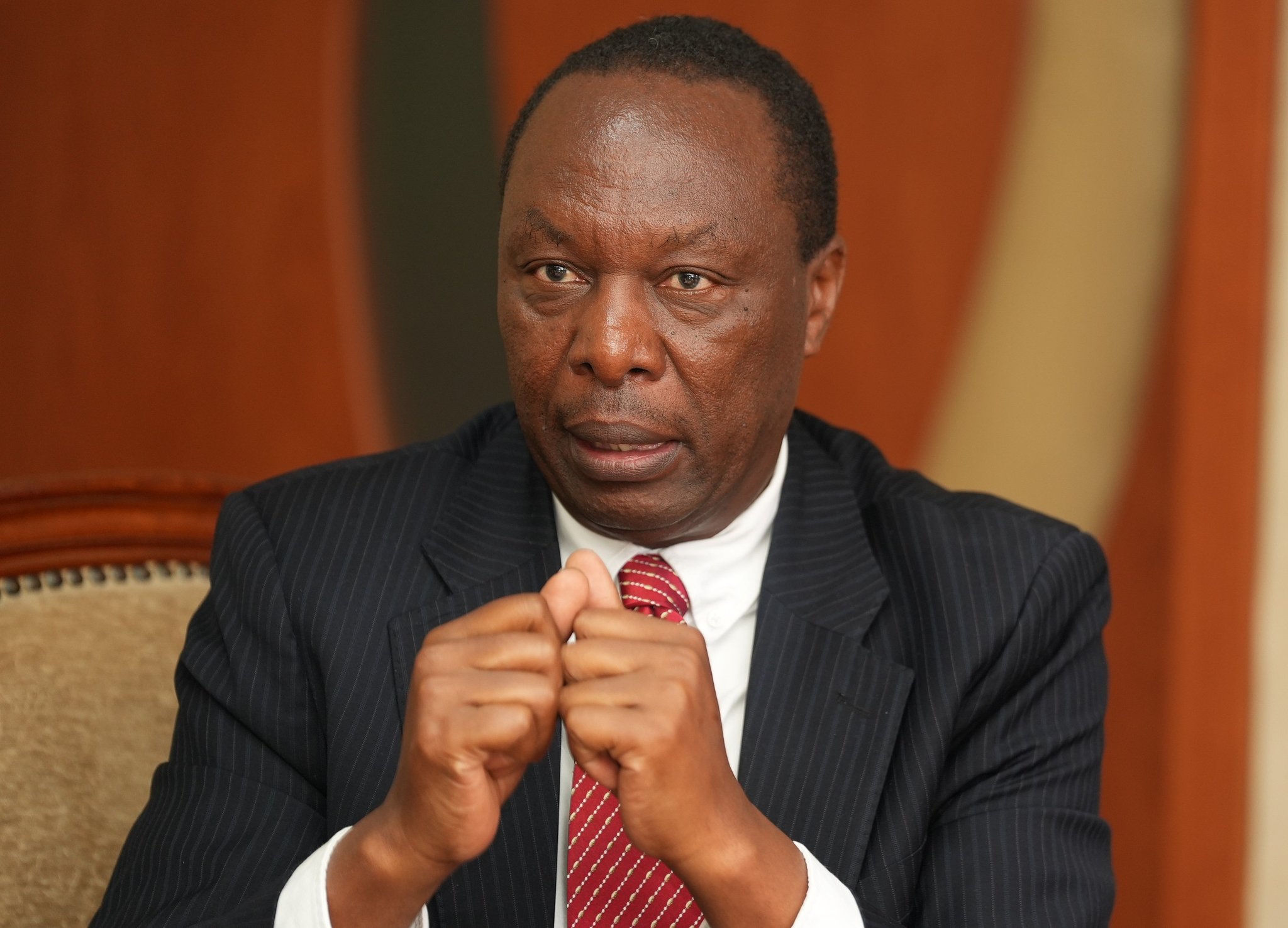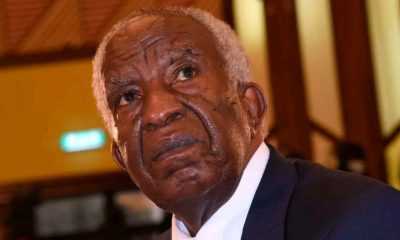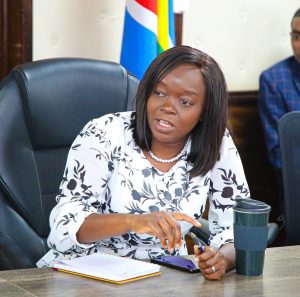Grapevine
Tender Wars at Forestry Ministry: PS Gitonga Mugambi at War with ‘Naïve’ CS Mulongo Over Control of Multi-Million Shilling Seedling Deals
The current dysfunction threatens President William Ruto’s tree-planting initiative

A bitter power struggle has erupted at the Ministry of Environment, Climate Change and Forestry, pitting Principal Secretary Gitonga Mugambi against Cabinet Secretary Deborah Mulongo in a conflict that threatens to derail the government’s ambitious tree-planting programme.
The dispute centres on irregular appointments and alleged tender manipulation worth millions of shillings, with Mugambi reportedly describing his boss as “naïve” and unfit for her position.
The controversy deepened following the Public Service Commission’s revocation of George Tarus’s appointment as Secretary Forest Development, a move that has exposed deep-seated dysfunction within the ministry.
Tarus, who has held the SFD position in an acting capacity since 2018, was allegedly irregularly deployed to the ministry by Mugambi in violation of PSC regulation 36 of 2020.
The PSC determined that Tarus had not met the minimum 15-year service requirement in forest policy and lacked the necessary three years as deputy director before his appointment.
Despite the PSC’s decision, sources within the ministry report that Tarus continues to report to work, claiming to be “well connected” and immune from removal.
His continued presence has created tension among senior technical officers, who accuse him of operating with “arrogance, bias and vengeance” while rewarding loyalists with questionable foreign assignment allowances.
The conflict between Mugambi and Mulongo reflects broader governance issues within the ministry.
Sources close to the matter claim Mugambi privately criticises Mulongo, describing her as incompetent and suggesting she only secured her position due to gender and political considerations following her brief stint at the Health ministry.
Mulongo’s appointment came after Moses Wetang’ula’s Ford Kenya party slot needed filling when Susan Nakhumicha was removed from the Health portfolio.
Critics argue this political maneuvering has compromised technical competence in forest management.
The infighting has serious implications for Kenya’s 15 billion tree-growing strategy, which aims to achieve 30 percent tree cover by 2032.
The programme has been plagued by coordination failures, with no established national coordination committee, monitoring systems, or proper secretariat structure.
Insiders are calling for investigations into how millions allocated for seedling programmes are being utilised and which suppliers are benefiting from the deals.
The lack of transparency has raised concerns about potential corruption in the sector’s procurement processes.
The Forest Society of Kenya faces criticism for remaining silent despite Tarus serving as its vice-chair while embroiled in the appointment controversy. Professional bodies typically distance themselves from such conflicts to maintain credibility.
Historical context reveals a pattern of institutional undermining within the forestry sector.
Former Environment CS Keriako Tobiko allegedly mounted campaigns to discredit the Kenya Forest Service while promoting the now-defunct Kenya Water Towers Agency, which received substantial funding despite audit queries.

President William Ruto joins a group of dancers for a jig during the National Tree Planting Day in Kiu, Makueni, County on Monday, November 13, 2023. PHOTO/PCS
The current dysfunction threatens President William Ruto’s tree-planting initiative, which has been elevated to a national exercise with its own public holiday.
However, implementation faces significant obstacles due to leadership conflicts and institutional weaknesses.
Key positions within the forest conservation directorate remained vacant from 2018 to late 2024, with PSC advertisements mysteriously cancelled multiple times.
This vacancy pattern suggests deliberate sabotage of the sector’s operational capacity.
The programme lacks essential coordination structures including multi-institutional technical teams, county implementation committees, and partnerships with international bodies like UNDP, UNEP, and FAO.
Resource mobilisation efforts through the UN Multi-Partner Trust Fund have failed to materialise.
Legal challenges continue as Dindi Oscar Okumu’s petition E100 in the Employment and Labour Relations Court seeks redress over the irregular appointments.
Tarus has filed opposing affidavits claiming his appointment followed constitutional requirements and due process.
The ongoing crisis highlights fundamental governance failures in Kenya’s environmental sector, where political considerations appear to override technical competence.
Without urgent intervention by CS Mulongo to address these dysfunctions, the country’s ambitious forest restoration goals remain in jeopardy.
The Forestry Society of Kenya now faces pressure to take decisive action regarding its compromised leadership position, while stakeholders await accountability measures for the millions allocated to questionable seedling deals.
As this power struggle continues, Kenya’s forest sector development hangs in the balance, with implementation of the National Landscape and Ecosystem Restoration Strategy 2023-2032 facing significant delays and complications.
Kenya Insights allows guest blogging, if you want to be published on Kenya’s most authoritative and accurate blog, have an expose, news TIPS, story angles, human interest stories, drop us an email on [email protected] or via Telegram
-

 Business6 days ago
Business6 days agoKakuzi Investors Face Massive Loss as Land Commission Drops Bombshell Order to Surrender Quarter of Productive Estate
-

 Investigations1 week ago
Investigations1 week agoINSIDER LEAK REVEALS ROT AT KWS TOP EXECUTIVES
-

 Investigations5 days ago
Investigations5 days agoCNN Reveals Massive Killings, Secret Graves In Tanzania and Coverup By the Govt
-

 Business7 days ago
Business7 days agoBANKS BETRAYAL: How Equity Bank Allegedly Helped Thieves Loot Sh10 Million From Family’s Savings in Lightning Fast Court Scam
-

 News1 week ago
News1 week agoEXPOSED: How Tycoon Munga, State Officials, Chinese Firm Stalled A Sh3.9 Trillion Coal Treasure In Kitui
-

 News1 week ago
News1 week agoEx-Boyfriend Withdraws Explosive Petition to Remove DPP After Criminal Case Against Capital FM Boss Resurfaces
-

 Politics6 days ago
Politics6 days agoI Had Warned Raila Of Possible Fallout In The Odinga Family After His Death, Oburu Says
-

 Business19 hours ago
Business19 hours agoConstruction Of Stalled Yaya Center Block Resumes After More Than 3 Decades and The Concrete Story Behind It




















